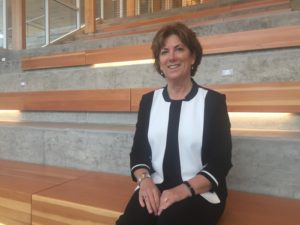As Camosun College continues to deal with the COVID-19 pandemic, president Sherri Bell says that the safety and well-being of students and employees is first and foremost, adding that this is a stressful time for everyone and that the future is uncertain.
“It’s a time that we’ll never go through again, hopefully, in our lifetime,” says Bell. “It’s been quite remarkable just to see how the college community has really come together and worked together to ensure people were safe but also ensuring that students had opportunities to finish this semester, and, at the same time, looking at the future down the road.”
On Tuesday, March 24, the college released a statement on its site saying it would follow the advice of health professionals and deliver the spring and summer semesters remotely. Bell says she doesn’t know what September will hold.

“That’s not an easy thing to think about,” she says. “Working with completely unknowns is so difficult for people. All we can do as a college system is listen to what’s happening, particularly from our provincial health officer [Bonnie Henry], and just move forward as best we can.”
Some courses are easier to deliver online than others. The trades, for example, require hands-on learning; Bell says the college will most likely have to suspend new intakes of trades students until further notice and it is focusing on getting the current cohort of trades students through their program.
“The deans and faculty are looking at what can be put online [and] what can’t be,” says Bell. “Trades are impossible to do without having hands on—that’s part of being an apprentice.”
For some courses, like Biology, it’s a combination of both theory and hands-on work. The theory can be done online, but the labs are harder to do remotely.
“It’s a work in progress, and I know people really want to have the answers to their questions soon, so we’re trying to do this work for next semester this week,” says Bell. “We’ll have answers coming up at the end of this week, beginning of next week.”
Bell says the college is tackling matters based on urgency. After everyone has a good sense of spring and summer, matters such as postponing or cancelling graduation ceremonies will be addressed.
Bell says one of the biggest concerns is how students are coping financially if they’ve lost work. The college is now using money raised in its Erasing Barriers campaign to provide immediate emergency funds to students in need.
“It’s not a large bursary for tuition or housing,” says Bell. “It’s more [that] any money we have coming in, we want to be distributing it out as quickly as we can, probably in different ways than we have in the past.”
(On Wednesday, March 25, after this interview was conducted, the college announced that students can contact Financial Aid for the Erasing Barriers $200 emergency student bursary if they’re experiencing financial hardships as a result of COVID-19).
“We’ve got money coming in, and we did have some funds put away,” says Bell.
As far as tuition for courses, or parts of courses, that need to be held on campus or in the community, Bell says that is still being worked through.
“That’s something that’s being worked on every day right now,” she says.
Individual courses were largely left to instructors to modify, simply because of time restrictions, but instructors were required to submit their plans to the chair of their department for approval. Bell says she is really impressed with how the instructors took that on.
“That’s what we’re known for, just the quality of instruction,” she says. “When we went into this, we left that up to their professional judgment… Faculty were not given a whole lot of lead time to flip their whole delivery method, so I have to say, I’m incredibly thankful and incredibly impressed.
On Wednesday, March 25, Bell had a telephone meeting with union representatives and the Camosun College Student Society (CCSS) to discuss various concerns; she says it’s important to hear from different groups within the college, she says.
“Employee groups are also concerned right now,” says Bell. “Everybody’s working and getting paid, but people are concerned for the future, and we don’t know what the future’s going to look like as a province moving forward.”
Bell says the province requires the college to remain open, even if that means offering classes online instead of on campus, and that any changes around that would come from Henry. For now, Bell says, everyone is concerned about the students.
“We will get through this,” she says. “It’s a bit cliché, but it’s true. Probably, we’ll learn something from it, and we’ll be stronger from going through this. I just hope that people can stay healthy and take care of one anther.”
